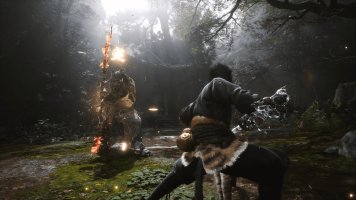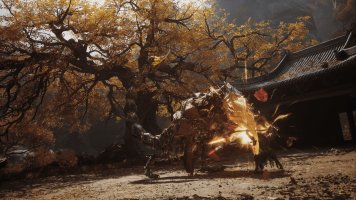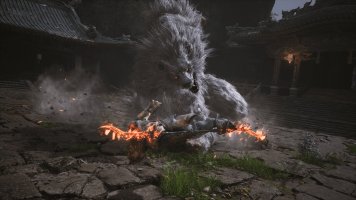General Information
Black Myth: Wukong's story is somewhat of a follow up to the classic novel Journey to the West by Wu Cheng'en, a book that I only personally know thanks to very loose adaptations like Dragon Ball and Enslaved: Odyssey to the West. That surface-level familiarity didn't help much though, as the interpretation that the developers at GameScience have crafted here is laden with references to characters and events from the novel without doing a great job of bringing you up to speed on who Sun Wukong is or what he encountered on his titular journey. I had to look online to understand who Zhu Bhajie was, what his history with Wukong is, and what the significance of certain encounters were, because otherwise I'd have been completely lost at times.
You play as The Destined One, a literal monkey who wakes up one morning and decides to set out on a roughly 40-hour journey to locate the six relics of Wukong. While the moment-to-moment storytelling is fairly unremarkable – largely due to a mute protagonist and side characters that aren't given enough screen time to develop – each of the six self-contained chapters culminates with a stunningly gorgeous animated vignette that tells a short story about that story's main antagonist. Each one is done in a completely different art style, with one drawn to look like a storybook, another using stop-motion animation, and another done in the style of an anime. Every single one of them is beautiful and poignant, and I couldn't help but wish that the main story managed to move me in similar ways.
My initial read on Wukong was that it was a soulslike, given the checkpoint system, the stamina bar that governs your actions in combat, and the dodge-heavy fighting style. But as it turns out, Wukong has more in common with traditional action games like what you might expect from Bayonetta developer PlatinumGames than it does with anything FromSoftware has made. Most of the usual soulslike conventions are missing: There is no penalty for death outside of respawning at the nearest checkpoint (no corpse run is required to regain your loot); you don't use a shared currency to level up your stats and purchase items or upgrades; and while there is gear and stats to consider, you largely just go and swap out the old equipment with the new as opposed to making choices as to what kind of weapon or piece of armor you want to hold on to and upgrade.
And even though I'm a big fan of soulslikes, ditching those mechanics feels like the right move for the game that Wukong is trying to be. It's far more forgiving, focused on keeping you in the action rather than poring over menus or retracing your steps to regain your lost currency after dying, and Wukong is a better, more distinctive game for it.
To be clear, though, when I say it's more forgiving I don't mean that it's any less difficult than a From-style game. In fact, I'd go so far as to say that between this and Elden Ring: Shadow of the Erdtree, I had more difficulty getting through Wukong's toughest challenges (and, no, there aren't any difficult options). But at the same time those challenges never felt unfair, and overcoming some of the tougher boss fights was always a satisfying combination of learning their attack patterns, figuring out where I could maximize my punishment windows, and tweaking my loadout in ways that made the best use of my chosen powers.
Combat in Black Myth: Wukong is simple and elegant, thanks in part to some tools that are really fun to play around with. Success hinges on a delicate balance of twitch reflex-style gameplay mixed with careful resource management that largely revolves around a Focus Meter which builds up when you land hits and perfectly dodge enemy attacks. You gain a Focus point whenever that meter fills up, which you could then spend in the middle of a light attack combo for a "varied combo," or you can just use a heavy attack on its own for a powerful strike that can be charged even further if two, three, or even four Focus points are consumed all at once.
You also have access to a small handful of spells, governed by a mana meter, that are versatile enough to be useful in a wide array of situations. The Immobilize spell, for instance, freezes enemies for a short time, allowing you to get in some quick hits and potentially stagger them to allow for even more free damage; Cloud Step turns you invisible and creates a decoy for your enemies to focus on while you break away, heal up, and then hit your foe with a surprise attack that can crit; Rock Solid briefly turns you into a statue that will cause an enemy's attack to bounce right off of you, giving you an opportunity for a counter-attack; Ring of Fire creates a barrier around you that will initially repel enemies, and grant you some health restoration and enhances any stat altering drinks you may use while standing inside of it; and finally there's my personal favorite, a Pluck of Many, which lets you make multiple clones of yourself to all gang up on an enemy.
Separate from that you've also got transformations, which allow you to morph into powerful creatures that you've already bested in battle. What's really cool about these is that they don't cost any mana (they're tied to a very lengthy cooldown instead) and they turn you into a totally different character, complete with an all new moveset, special moves that use your focus meter, and more. For example, one of the first bosses you fight is a wolf with a fiery dualblade that has a lightning fast dash attack. When you defeat him, you'll gain his transformation and be able to do that very same dash attack to your enemies, and once you build up his focus meter, you'll even get to do a hugely powerful leaping strike that can ignite foes and deal damage over time to them.
And finally there are Spirit Skills, which are earned by defeating certain more powerful versions of enemies and absorbing their essence into your gourd. These are effectively transformations that only last for one attack and are also tied to a fairly lengthy cooldown, but it's great to be able to, for example, use the Wandering Wight's powerful headbutt attack to get an extra stagger after immobilizing an enemy. These Spirit Skills can also be leveled up, which makes it so that even early game Spirits never lose their strength as the campaign rolls on.
It's an excellent blend of options, especially when mixed with some truly incredible boss fights, and Wukong introduces all of these elements at a thoughtfully measured pace so that I never felt overwhelmed. Make no mistake: The Destined One is extremely powerful, and being in control of him is definitely a heck of a power trip – even beyond the many powers and abilities he has at his disposal, nothing beats the feeling of just slamming a 50-foot bo staff down onto an enemy's head – but I still had to be smart with how I used my spells due to the fact that mana restoration is actually very difficult.
This is where the resource management aspect of combat comes into play: I had to carefully consider what spells were actually worth the mana cost, whether I should save them for a more difficult second phase of a fight, and whether or not I could capitalize on the opportunity if I were to spend the mana in the first place. For instance, even though its my most powerful spell, I often had to hold off on casting my Pluck of Many spell that duplicates my monkey since it has an extremely high mana cost – if i cast it at a bad time, the boss could simply wipe all of my clones out with an AOE attack before they even got a chance to get some damage in. Sometimes the adjustment I had to make when I was stuck on a boss was a simple change in how I used my abilities, and the act of coming up with a new strategy and having it pay off was always extremely satisfying.
While boss battles are where Wukong is at its best, there's also a highly respectable amount of enemy variety in its regular fights. Level design is of the "wide-linear" variety, usually with a clear main path that leads you from checkpoint to checkpoint, but plenty of opportunities to venture off that path to discover optional goodies. The rewards for exploration are great, too: I've found rare crafting materials to make new weapons or armor, special enemies that drop a new Spirit Skill, Curio items that I could equip to enhance my build, and treasure chests that might permanently increase my max health, mana, or stamina, all of which made the time I took to find them feel well spent.
On top of that, there are several secret boss fights to discover, key items with mysterious uses that I still haven't figured out, and plenty more reasons to stray from the beaten path and keep an eye constantly scanning the environment. The main one being that Wukong is one of the most gorgeous games I've ever played – every environment is brimming with detail, from the chipped pieces of bark on the trees in the forest, to the real-time deformation of the snow as The Destined One moves through it while dragging his staff along. Not only that, but the animation is incredible too, with wonderful touches and flourishes like the way your character will do a little hop step while locked on to an enemy, then change to strafing around them as opposed to just straight on running while keeping their head turned. The music and sound design is fantastic as well, with epic drum-thumping battle themes and melodic flutes and chimes adding to the air of wonder and mystery as you explore the unknown.
All that said, this game would have benefitted from a map, plain and simple. The lands you explore in Wukong are beautiful, no doubt, but they're far too big and too crammed with secrets to not give you some sort of navigational help, especially the second and third chapters. This, along with the fact that it's aggravatingly hard to tell what obstacles can actually be climbed over and what's an invisible wall, can make exploration quite cumbersome. It's a good thing the rewards are worth it.
However, it's hard not to feel like all of Wukong's splendor and detail came at a great cost. I experienced numerous crashes, with one particular heartbreaker happening right after defeating an extremely tough boss that I then had to defeat again. Several others were more minor and would typically happen as I was loading up a new chapter or fast traveling to another level, but they eventually add up to a lot of frustration.
In addition to that, several times during important cutscenes, all dialogue audio and subtitles would drop out completely, leaving me without any clue as to what was being talked about and no way to rewatch the cutscene; characters would occasionally switch to speaking in Chinese all of a sudden despite me having the audio set to English; the lipflaps of the English dub do not even remotely match what's being spoken; and most of the journal entries you find along the way haven't even been localized yet into English.
The worst, though, was one particular fight in which the boss would plunge me down through the ground during the transition to its final phase, only to have me fall through the world once I regained control of my character. This kept on happening to the point where I thought my game was unavoidably bugged and I wouldn't be able to reach the end, but my insanity of trying the same thing over and over again eventually yielded a different result for no discernible reason.
These are the kinds of technical problems that GameScience will hopefully look to address in post-launch patches – and it's not outside of the realm of possibility, as even Cyberpunk 2077 was eventually whipped into shape after its own buggy launch (another game that conspicuously didn't let anyone try its console version before release). I hope those fixes come swiftly, because while I still wholeheartedly think the things Black Myth: Wukong does so right are worth dealing with those problems, I would love to be able to recommend it without those caveats.
Verdict
As GameScience's debut action game, Black Myth: Wukong is mostly a great success, despite some major technical black marks and localization issues that are likely to cause some frustrations at launch. Combat is fantastic thanks to a great balance of careful resource management and lightning-fast, twitch-reaction gameplay that tested my skills as much as Elden Ring ever has, despite being a more traditional action game than FromSoftware's style. Not only that, but there are a ton of exciting boss battles, a great variety of enemies, and the world they inhabit is an absolute treat for the eyes and ears. Its story has its moments but relies a bit too much on having prior knowledge of the events of Journey to the West, and it really could have used a map to make its rewarding exploration measure up to the strength of its combat. That said, its strengths more than carry it through, making Black Myth: Wukong a great action game that could be even greater if GameScience can squash the bugs.







